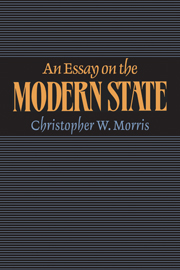5 - Reasons
Published online by Cambridge University Press: 05 June 2012
Summary
RATIONAL JUSTIFICATION
A state, I suggested, may be justified in one sense if it provides the relevant people with reasons to respect its laws and to support it in various ways. If justice and other moral elements are excluded from this account of reasons, then we might call this a kind of rational justification of a state. As I said, some political thinkers believe this is the sort of justification that is called for by states. Sovereign states, on their view, may be needed for social order, especially when people have incompatible views about justice. And where there is little agreement about justice and other moral matters, the latter cannot be the basis for legitimation. “Realist” accounts of legitimacy may be understood thus. This sort of position may be most plausible if it is seen as derived from some kind of skepticism about morality or “right reason”. It is possible to read Hobbes this way. We could understand the Hobbist Sovereign to be an arbitrator made necessary by disagreement and conflict:
as when there is controversy in an account, the parties must by their own accord, set up for right Reason, the Reason of some Arbitrator, or Judge, to whose sentence they will both stand, or their controversie must either come to blowes, or be undecided, for want of a right Reason constituted by Nature; so is it also in all debates of what kind soever: […]
- Type
- Chapter
- Information
- An Essay on the Modern State , pp. 114 - 135Publisher: Cambridge University PressPrint publication year: 1998



